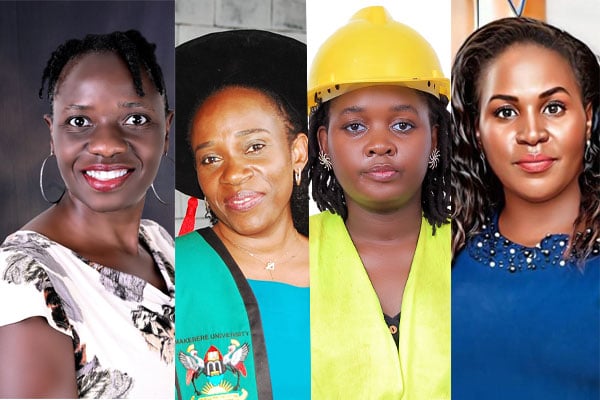Why few career women are buying homes

The female buyer prefers apartments with amenities that require minimal maintenance and are close to amenities such as schools, hospitals and shopping centres. PHOTO/unsplash.com.
What you need to know:
The majority of women who buy homes individually are those working in the diaspora. Women buying property as a consortium rather than individually is one of the trends in the property market.
There is a trend of women investing in property through investment groups or solo. But generations of women on the housing ladder are still very low. So, what makes women less inclined to own homes or land yet it is one of the most valuable family assets? What determines the property they buy and how is the real estate market responding to this?
Findings show that even with more money to spend, women are not active in the property market. Married women are the largest owners of homes while unmarried women are the least.
But even married women who own property are in co-ownership with their husbands. Among these, the property is often registered under someone else’s name. Meanwhile, only minimal percent of women own a title deed.
Lack of information
Experts cite a lack of knowledge, inadequate financial support, structural challenges, and cultural drawbacks as the reasons for the low uptake of real estate among women.
Samah Rustam, a development, sales, and letting adviser at HassConsult, says most women lack specific knowledge of real estate, which hinders them from acquiring property.
This affects both those with the wherewithal to buy and those without.
‘‘There is a significant number of women who do not know that some investments can be secured with stretched payment plans. Some of these properties undergo capital appreciation over time, something they may not know,’’ she says.
George Wachiuri, the chief executive of Optiven, a seller of land, notes that family is the main motivator for the acquisition of property among women, with young couples with two and three children buying more than the older ones. He says today, more women than men are buying property, especially those in the middle-income quantile.
‘‘Most of the enquiries we get and the actual purchases come from family women. These are often looking at the future of their children living in their own homes rather than renting out,’’ Wachiuri says.
Marital decisions
Many married women leave investment decisions to their partners, and start seeking investments when they feel they want to be independent and must have a portfolio of their own.
Gregory Mwaura, a psychologist notes that marriage is a game of power and money, property and land symbolise influence.
‘‘More women, including married ones, are acquiring property after the realisation that it is a form of personal security. In case of any eventuality in their marriage, such as divorce, they have ready resources to acquire property and assets,’’ Mwaura says.
It also represents freedom. ‘‘A married woman with assets registered under her name has more options than one who has none,’’ he adds.
In a capitalist society such as ours, he notes, owning assets enhances a woman’s capacity to nurture.
‘‘Property comes with the security that as a caregiver, you will be able to provide for your dependants,’’ Mwaura says, adding “even in marriage, there should be boundaries, openness and respect for personal ownership of assets. There is a difference between what is for the family and what is personal.’’
In the last three decades, the number of women in the workforce has increased, with some of them taking up managerial and executive jobs. Has this rise of women professionals corresponded with female home loan borrowers?
Discrimination
Samuel Tiras Wainaina, the director of Dream Credit, a microfinance institution, says most financiers still discriminate against women.
‘‘The huge financial outlay required to pay off a mortgage is out of reach for most women,” Wainaina says, citing a lack of collateral as the reason most institutions are disinclined to advance loans to women.
Sometimes cultural and patriarchal stereotypes get in the way of property ownership among women, including educated ones.
‘‘In most societies, even coffee bushes, tea and land were owned by men,’’ says Wainaina, who served as the first chief executive of the Women Enterprise Fund (WEF).
Shafana Rajani, the executive director of Laser Property Services, a real estate agency, argues that the woman is ‘‘still not empowered enough.’’
‘‘It is true we have more women professionals today than 30 years ago. The sad reality, though, is that women continue to secure either entry-level or mid-level jobs with average incomes,’’ she argues.
This income, she adds, barely covers their cost of living for themselves and their families. ‘‘This makes it harder to own property,’’ she says.
Pickier buyers
Unlike men, however, women are pickier about where to buy and what to buy, preferring value-added products to just land. For the female buyer, apartments with amenities that require minimal maintenance are as attractive as those near schools.
‘‘Nearness of schools and hospitals is the biggest pull for women buying property. They can commit to buying more easily than when these amenities are unavailable or far away,’’ Wachiuri says.
Rajani agrees, noting that homes and land in places with advanced health and education amenities are becoming more popular with middle-income women by the day. But like men, they too consider affordability before committing to buy. Rajani says affordability is determined by the earning power and financial capabilities of the buyer rather than cheapness.
“Women are disadvantaged in this aspect because most of the high-paying jobs in Kenya are held by men. Women also have more responsibilities,’’ she says.
Buyer’s profile
Even so, some are accumulating wealth by buying property. But what does the average woman who owns property look like? Rajani says this woman is ‘‘financially stable through employment’’ and sometimes occupies an executive position in an organisation. If not employed, the woman often has stable investments and a reliable income. This woman, she adds, enjoys an ‘‘excellent credit rating.’’
‘‘The woman home buyer is educated in finance and wealth management. This helps her to plan for herself and her family accordingly,’’ she says.
In some cases, this woman is either married to a ‘‘financially strong partner’’ or has wealthy parents who support her. ‘‘When her husband is financially stable, the woman can divert her earnings to invest in property because the partner meets the other family obligations,’’ Rajani explains.
On financing, she notes that most of the mortgages target either women entrepreneurs or those with a regular income. ‘‘Financiers often prefer applications by women to men because they are considered more efficient and reliable when it comes to payment of loans,’’ she says.
The majority of women who buy individually are those working in the diaspora. Women buying property as a consortium rather than individually is one of the trends in the property market.
‘‘There are Saccos of women formed for purposes of buying property,’’ Rustam of HassConsult says. Other than the family, some women acquire property for self-actualisation purposes, says Mr Mwaura. Like men, women too have aspirations they hope to fulfil.
‘‘For some, it could be to own a certain type of car or house in a certain neighbourhood in their lifetime. These happen whether they are married or unmarried,’’ the psychologist says.
Divorced buyers
While family provides an ideal environment for women to own property, divorce compels them to buy property, especially where children are involved.
For 10 years, Sheila Muthoni and her husband had lived happily in their five-bedroom home. But when they divorced in 2019, she found herself stranded.
‘‘Our house had been registered under his name. I was practically homeless. I had to mobilise my savings to buy a home. Luckily I had put something substantial aside,’’ says the commercial lawyer.
Muthoni says that while the new home is smaller than the one she was used to, she is contented.
‘‘I can raise my son with fewer worries.’’
Culture
In many cultures, property ownership is regulated by customary laws; mostly unwritten but influential local norms—based on gender distinctions. These laws which have even greater influence than statutory law effectively deprive women of property rights both in their natal and marital clans.
Bias
Real estate marketing is always family-oriented, with the male member being the decision maker and buyer.
However, with the rapidly changing nature of stereotypes, maybe it is in the best interest of developers to create marketing campaigns that look towards home ownership by women.




